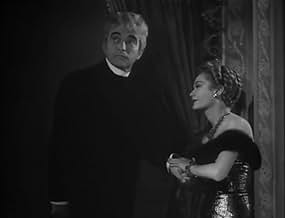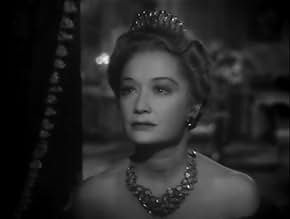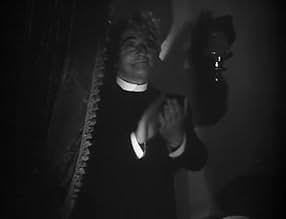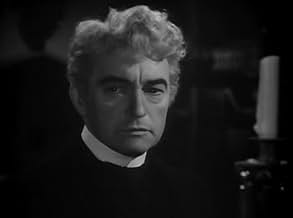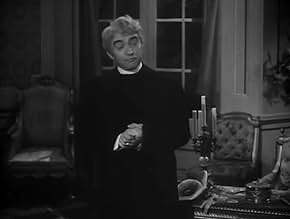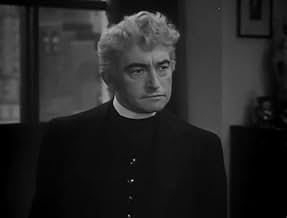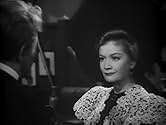अपनी भाषा में प्लॉट जोड़ेंA messy divorce leaves Mrs. Leslie Carter shunned by Chicago society for being an adulteress and forbidden from having custody of her son. She's determined to return to her hometown in a few... सभी पढ़ेंA messy divorce leaves Mrs. Leslie Carter shunned by Chicago society for being an adulteress and forbidden from having custody of her son. She's determined to return to her hometown in a few years as a success and with enough money to fight to get her son back. In order to realiz... सभी पढ़ेंA messy divorce leaves Mrs. Leslie Carter shunned by Chicago society for being an adulteress and forbidden from having custody of her son. She's determined to return to her hometown in a few years as a success and with enough money to fight to get her son back. In order to realize her plans, she heads to New York with ambitions of being a great actress. Despite having... सभी पढ़ें
- पुरस्कार
- कुल 2 जीत
- Dudley Carter
- (as Johnnie Russell)
- Mrs. Peabody
- (बिना क्रेडिट के)
- Miss Humbert
- (बिना क्रेडिट के)
- Man in Belasco's Outer Office
- (बिना क्रेडिट के)
- Observer on Courthouse Steps
- (बिना क्रेडिट के)
- Audience Member
- (बिना क्रेडिट के)
- Scenic Artist
- (बिना क्रेडिट के)
फ़ीचर्ड समीक्षाएं
The film begins with the divorce trial of Mr. and Mrs. Carter. All the reasons for this and what led to this isn't mentioned--other than the fact that she (Miriam Hopkins) was seen as an adulteress. In the end, she loses the case and her millionaire ex-husband is given custody of their young son. In a desperate attempt to earn money, she heads to New York and has some very naive expectations about becoming a star. However, surprisingly, she meets the great Belasco (Claude Rains) and he molds her into a star.
After years of being a star, Mrs. Carter has the nerve to have a personal life. When she marries another actor, Belasco writes her off--vowing never to speak to her again--and vice-versa. What follows is a lean period--when jobs are scarce and she is at her lowest. But, being a trooper down deep, she manages to pull it together and make a career for herself on her own. Oddly, however, this feud and her subsequent success was handled way too fast--creating little tension and ending very abruptly--a major handicap for the film. However, it's still worth watching--as Hopkins is at her best.
Miriam Hopkins and Claude Rains give wonderful performances. Hopkins was a beautiful actress who really makes us feel for Mrs. Carter. Rains is great as the flamboyant, egotistical producer/writer/actor/impresario David Belasco, one of the great names in theater.
Though Mrs. Carter's second husband, Lou Payne, served as adviser on this film, it's a poor representation of the real events of Mrs. Carter's life. True, there was a much publicized and bitter divorce, and she was undoubtedly viewed as a scandalous character for that and for becoming an actress. However, she had custody of her son Dudley, so there was no custody battle. Once she broke with Belasco, she did not go back to him and, in fact, started working in vaudeville and actually made some films toward the end of her life. She did indeed marry Lou, and he became her leading man in many productions.
The driving force for Mrs. Carter in the beginning of this film is regaining custody of her son, but she finally realizes that in her time away from him, he is thoroughly bonded with his father. In the film also (and I'm not sure if it was true in real life) she traveled with her mother and lived in a theatrical boarding house, which gives the film some added interesting atmosphere.
Not a bad movie, probably not a depiction of the greatness of either Carter or Belasco. One of Mrs. Carter's most famous moments was in The Heart of Maryland, where she wore a wig with six-foot tresses. Off-stage, fans blew her hair as she hung 35 feet above the stage clutching the center of a bell to keep it from ringing. Quite a visual.
Belasco was not flawless. He was an egomaniac, who insisted on total obedience to his direction if anyone sought him as an acting mentor (as Mrs. Carter did). He was also determined to be memorable as a personality, going about in a suit reminiscent of the Roman Catholic Church (he basically dressed like a priest). While he did improve the acting of his period, his taste in drama tended to be of the melodramas and sentimental play variety. Brooks Atkinson (in his book, Broadway) dismissed him as a ham and poseur, but he was better in bringing a professional structure to acting. Too frequently in that period actors were not as prepared or controlled to give their audiences their money's worth of good acting.
Mrs. Leslie Carter was a minor socialite from the midwest who wanted to go on stage. In the movie she is played (rather well) by Miriam Hopkins. Mrs. Carter got involved in a messy divorce from her husband, in which she lost custody of her only son. Under Belasco's tutalage she became one of the leading female stars of her age. She did try to resume her relationship with the son, but she was so involved in building her art and stage reputation her son was nearly ten when she saw him again. The relationship was never resumed. As for her career it blossomed, but she decided to remarry. Belasco expected to be consulted and wasn't, so he broke with her.
After a decade of floundering, a rapproachment with Belasco was arranged, and her career resumed it's previous success.
As an interesting slice of theatrical history THE LADY WITH RED HAIR (which, ironically, is a black and white film) is worth watching. Rains and Hopkins give their typically best work in their lead roles. I would definitely recommend the film.
However, as the very theatrical title lady, MIRIAM HOPKINS gives an over-the-top melodramatic touch to her entire role, making it seem implausible that theater patrons would give her "acting" such a standing ovation. Indeed, the worse part of the film is when it shows Hopkins practicing her art or giving a demonstration of her talent as a stage actress.
The other flamboyant performance is given by CLAUDE RAINS, but rightfully so, since he's playing David Belasco who apparently liked to "ham it up" at every opportune moment whether teaching others how to act or simply acting up a storm in his personal life.
Director Curtis Bernhardt has done nothing to keep Hopkins or Rains from all the theatrical excesses they bring to their characterizations, but we do get some good supporting work from HELEN WESTLEY as the boarding home owner, LAURA HOPE CREWS (as Miriam's mother), JOHN LITEL as a producer, and many other Warner contractees. But RICHARD AINLEY is colorless in the sort of part that could easily have gone to CORNEL WILDE, who instead has a bit part as a wannabe actor at the boarding house. Ainsley's performance is wooden indeed and pales opposite the strident and mannered acting of Hopkins.
Interesting but something about the screenplay suggests that much was altered and cut in producing this film based on Leslie Carter's memoirs. Little JOHNNY RUSSELL appears briefly in two scenes as Carter's son, the one she loses custody of in a court battle. (He played Shirley Temple's little brother in THE BLUE BIRD shortly before this film).
Mrs. Carter was a society socialite whose rather messy divorce and custody battle made her want to seek employment in the theater when she couldn't get a job doing anything else. After a few tries she hook up with David Belasco who molds her into a glamorous stage star from the turn of the last century.
What I found amazing in this whole film was that we never do find out just what in this divorce made her such a notorious woman. The film opens as the divorce proceeding is about to conclude, we never see what it was all about.
We do find out that the terms of the divorce gave her limited visitation rights to her son. That's given as the real reason for her determination to succeed as opposed to possibly trading in on her notoriety. A reason today's audience would definitely understand. In fact why was she billed as "Mrs. Leslie Carter" if it wasn't for the notoriety.
Miriam Hopkins as Carter and Claude Rains as Belasco give a good account of themselves. So do those two old gals Laura Hope Crews as Hopkins's mother and Helen Westley as the owner of the theatrical boardinghouse where they reside. Those two date back to when Mrs. Leslie Carter was a big name on Broadway.
Richard Ainley of the Ainley British theatrical family gives a wooden performance in a part that's underwritten as Carter's second husband. Wasn't Errol Flynn available?
Back in the 1890s divorce in and of itself was scandal. So why weren't we given the salacious details?
क्या आपको पता है
- ट्रिवियाLouis Payne, the husband of Mrs. Leslie Carter in real life, coached Richard Ainley, who was playing him in the movie.
- गूफ़None of the Broadway plays mentioned in the movie were performed by Mrs. Leslie Carter. Her Broadway debut was in a play called "The Ugly Duckling" in 1890, not "The Way of Beauty." Her second play was "Zaza," not "The Lady From France." It is not known why the names of her plays were changed.
- भाव
David Belasco: The scene is finished... either applaud or get out of the way.
- साउंडट्रैकTwinkle, Twinkle, Little Star
(uncredited)
Traditional
Played offscreen at the start of Miss Humbert's school sequence
टॉप पसंद
विवरण
- रिलीज़ की तारीख़
- कंट्री ऑफ़ ओरिजिन
- भाषा
- इस रूप में भी जाना जाता है
- La dama de cabello rojo
- फ़िल्माने की जगहें
- उत्पादन कंपनी
- IMDbPro पर और कंपनी क्रेडिट देखें
- चलने की अवधि
- 1 घं 18 मि(78 min)
- रंग
- पक्ष अनुपात
- 1.37 : 1


